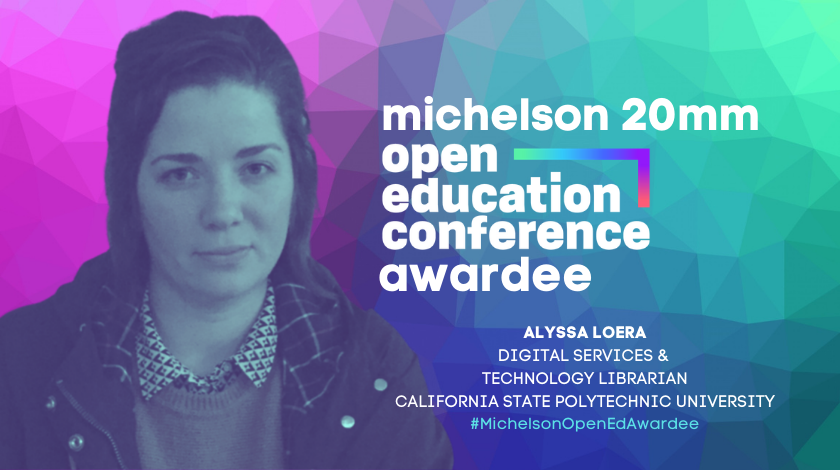Over the next few weeks we will be sharing reflections from our scholarship recipients on their experiences at this year’s Open Education Conference. Today we are featuring Alyssa Loera, a digital services & technology librarian at California State Polytechnic University.
As a first-time attendee of the Open Education Conference, I was not entirely sure what to expect. This year’s unique virtual format and a higher education landscape burdened by the pandemic made me even more apprehensive. But any concerns I had were swiftly allayed by the breadth of insight presented and the emphasis on both equity and accessibility throughout the schedule. I’m still new to the world of open education, but can already see and appreciate the work being performed by conference participants. The effects of open education efforts are becoming clearer, and I understand why we are committing to creating an environment of open and equitable knowledge.
At the start of the conference, open experts Staci Gilpin and Virginia Clinton-Lisell aligned the benefits of open educational resources (OER) under redistributive, recognitive, and representative social justice frameworks. They highlighted known issues and drew connections to how the status quo in academia perpetuates systemic injustices through a lack of diverse representation in textbooks, the exclusion of historically underserved student needs, and the lack of participation laden in non-OER assignments and materials.
Open advocates Maha Bali and Mia Zamora framed equitable emergence by applying Nancy Fraser’s model of social justice and emphasizing humanity, intentionality, and empathy. They made broad connections to equity, but also used a critical lens to challenge the practical efforts behind equitable engagement. For instance, they asked, “What is equity without care, and what is care without equity?” Bali and Zamora challenged us to interweave and even center care in the work that we do in the open education movement. I had never associated care work and open access before, but as mentioned by the presenters, “Care without equity is caring for a few and can exacerbate inequality.” Equity without care plays out in ways that lead to tokenism, and diversity theaters.
The other sessions I attended supported this idea of considering people over the end goal. In “Rebuilding Open Courses for Equity, Diversity, and Inclusion: A Community College Perspective,” the panelists directly applied EDI questions and frameworks to existing open courses, convening the need for criticality in ongoing open education efforts. Being open, after all, is not enough.
Before attending the 2020 Open Education Conference, I think my views on the interplay between open and equity were rudimentary if not simplistic. I incorrectly assumed that by virtue of being open, the thing (whether it’s the course, the course materials, or the pedagogical approach) must be equitable. In truth, open education is intended to foster participatory and sustainable learning, but that does not mean it is a movement that is free from revision. I appreciate the participants in the movement who are bringing equity tools into open work and giving the broader community an understanding of how the fight for social justice occurs at every level of the education system. The discourse at this year’s conference indicated that there is a lot of ongoing and hard work to be done, and we are here for it.
